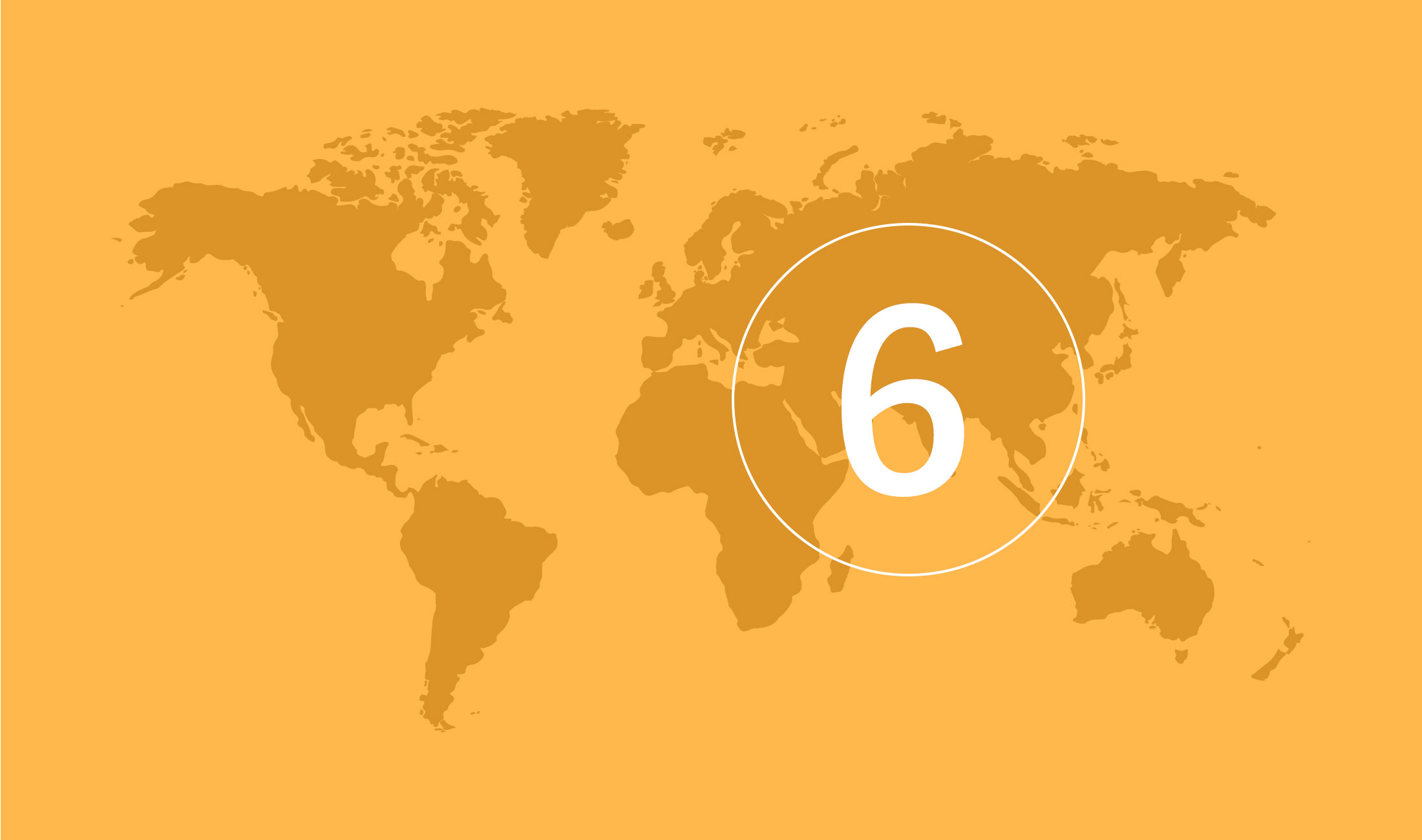
Egypt
Category
6 of 7
| Risk type | Short | Long |
|---|---|---|
| Sovereign | ||
| Public | ||
| Bank | ||
| Corporate |
The icons indicate EKN's risk assessment.
A lower country risk category means a lower country risk. The icons mark EKN's ability to cover risks to different buyers in the country.
-
No policy established
- EKN has not analysed this country recently and therefore has no current opinion. If an exporter submits an application for such a country, EKN performs an analysis of the country at short notice and determines a policy.
-
Normal risk assessment
- EKN decides on guarantee issue based on an assessment of risk in the transaction. There are no predefined restrictions in the risk assessment or assumptions for risk assessment.
-
Restrictive risk assessment
- EKN sets stricter requirements in the risk assessment in order to guarantee a transaction. EKN may have specified special criteria that are key to the risk assessment of the guarantee holder category in question. This may mean that EKN sets a requirement that the counter party must have its own hard currency earnings or that external support can be expected, or that EKN sets a requirement for a letter of credit, government or bank guarantee. If the formulation of the transaction deviates from a defined restriction, we normally set more stringent conditions and may in the worst case refuse to guarantee the transaction. More stringent conditions may be that we reduce the sum guaranteed, raise the premium or require some form of security.
-
Normally off cover
- Here EKN does not normally cover currency transfer risks. However in some circumstances EKN may be able to go further with high risk countries than the restrictions of the country policy indicate. The application is then tested under the so-called GSL facility, which refers to guarantee issue with special country evaluation. There are specific requirements for this, primarily that the exporter has experience of the market in question. The risk is then shared with the exporter and by means of a mark-up on the premium.
-
OECD or EU countries
- Because of EU rules, EKN cannot issue guarantees for transactions with a risk period of less than two years for exports to Australia, EU countries, Iceland, Japan, Canada, Norway, New Zealand, Switzerland or the USA. If you have any questions, please telephone us on +46 8-788 00 00.
Country risk analysis
Country risk analysis archive
Country Risk Analysis of Egypt
The latest Country Risk Analysis of Egypt was issued in November 2022.
Risks of public debt distress
Following the Arab Spring of 2011 and the subsequent turbulent years, the Egyptian economy has recently begun to stabilize. Thanks to public sector reforms and improvements in the country’s currency arrangements linked to IMF programs initiated in 2016, confidence in the Egyptian economy has slowly returned and the country has regained access to international capital markets.
The country’s economy is diversified and driven by agriculture, gas exports, tourism and revenues from the Suez Canal. Access to financial support from multilateral donors and a relatively good relationship with the IMF provides safety net. The economy proved to be resilient during the pandemic and was one of the few in the region to grow in 2020, but structural challenges remain.
Risks of public debt distress combined with vast external financing needs remains the country’s major weakness. Government debt of 89 per cent of GDP, and the interest payments generated by this, exaggerates the fiscal deficit which was close to seven per cent of GDP in 2021. The cost of the government debt is high, accounting for 40 per cent of government revenues.
The external position is vulnerable. International gross reserves have declined recently and correspond to almost four months of import coverage. A structural current account deficit, around three and four per cent of GDP, increases dependence on external financing. External debt is relatively low around 30 per cent of GDP. The external debt service is still manageable because a large part of the debt consists of so-called soft loans (with low interest rates and long maturities).
Negative impact from the conflict in Ukraine
The fallout from the war in Ukraine is placing severe pressures on the country’s economy. Egypt is the world’s largest importer of wheat, with Russia and Ukraine accounting for some 80% of those imports in 2021.
Elevated food and energy prices, combined with a steep fall-off of tourism from these countries, are adding to already rising inflation and a deterioration of the country’s external position. The risk of social unrest due to a higher cost of living is increasing.
The risk premium on government bonds has increased, which limits the country’s opportunities to borrow on the international capital markets. The downside risks are balanced against swift action by the Egyptian authorities to avoid a balance of payments crisis. In March 2022, the central bank raised its key interest rate and devalued the currency, resulting in the Egyptian pound falling to its lowest level since 2017.
The government has asked for financial support from the International Monetary Fund (IMF) and a new agreement with the IMF was recently reached. To improve the country’s competitiveness, support exports and attract foreign investment, the IMF advocates the Central bank of Egypt (CBE) to move to a flexible exchange rate regime.
To gain access to the support, the CBE has once again raised the policy rate and allowed the currency to float. Given continued support from the IMF and from the Gulf countries, the risk of balance of payments crisis in the short term is mitigated.
A crucial part of the present and previous IMF programmes, including the pandemic-related loan that the IMF issued to Egypt in 2020, are structural reforms to strengthen the private sector. In 2013, a military coup ousted the country’s previous government and president Abdel Fattah al-Sisi formed a military-backed government. Thereafter president al-Sisi has held the presidency with a firm grip.
During al-Sisi’s presidency, numerous constitutional amendments have been implemented, which enables the Egyptian president to likely remain in office until 2030. The military have become an important stakeholder in the Egyptian economy, as they benefit from free or cheap labour, energy and land.
A large and young population means that the private sector must be a priority in order to reduce unemployment in the long term. There are numerous on-going efforts to improve the business environment, such as the National Structural Reform Programme 2021–2024, but the government’s ability to strengthen the sector appears to be limited.
Long-term GDP growth is forecasted to be robust around four to six per cent. Main contributors will be investments in the energy, property, and transportation. Since 2015, investments in the energy sector have enabled the extraction of natural gas resources via the Zohr field.
As a result, Egypt is now generating a small energy surplus and the government has ambitious plans to transform Egypt into a regional natural gas hub. However, the high level of indebtedness makes the country vulnerable to economic shocks.
A continuing prudent fiscal policy is required for the government finances to remain sustainable over the long term, albeit the country is likely to have a significate need for external support in the foreseeable future. Egypt has struggled for a long time to attract foreign investors, which if successful would constitute a stable source of foreign currency.
It requires structural reforms that facilitate the private sector and improve the business environment by increasing transparency and reducing corruption. A continued good relationship with the IMF can however provide a solid basis for successful implementation.
Business environment
The World Bank’s Ease of Doing Business Index ranks Egypt 114 out of 190 countries (2020). The country is ranked at a lower level than other countries in the region, due to a weak business climate with corruption, bureaucracy and lack of transparency. Bureaucracy and corruption cause difficulties for creditors in enforcing court judgments and recovery in the case of bankruptcies.
The rule of law is inadequate, and the outcome of legal proceedings is unpredictable. In the Transparency International’s Corruption Perceptions Index (CPI), Egypt ranks 117 out of 180 countries, which is high but is in line with the average for the region.
The lack of free speech makes information gathering more difficult. The World Bank’s Governance Indicators (WBGI) rank Egypt below average for the region for various measures relating to institutions and the regulatory environment. Since the constitutional amendments in 2019, the president has strengthened his control over the judiciary, via, among other measures, the appointment of judges.
Complex rules and bureaucracy mean that lawsuits are often protracted. New rules can also be implemented quickly and enter into effect immediately. Information about new rules can be difficult to find, resulting in unpredictability in terms of trade.
Thanks to reforms in the early 2000s, the country has established a stable and resilient banking sector, which has been able to withstand the difficult economic conditions following the 2011 revolution. The process of privatisation is slow, and the country’s central bank is not completely independent, but a new banking law was implemented in 2020 that strengthens supervision of the banking sector and expands the independence of the central bank.
Now the banks are obligated to follow the guidelines for Basel III. The banking sector is liquid and has a moderate level of profitability. It is anticipated that the banks will remain well-financed thanks to significant customer deposits and remittances from Egyptians working abroad.
For several years now, the banks’ primary function has been to finance the central government budget deficit instead of lending to the private sector. The exposure to the Egyptian state dominates the credit risk for the banking system and links the banks’ creditworthiness to the state.
Asset quality in the sector is moderate and the proportion of bad loans to total loans is at a level of 3 per cent. Asset quality is expected to deteriorate over time due to a difficult macroeconomic environment, which is characterised by a shortage of hard currency, high inflation and a global tightening of financing conditions.
EKN's policy
EKN has been classifying Egypt in a country risk category of 5 out of 7 for the past three years, an assessment made in co-operation with the OECD. Egypt was upgraded in January 2019 as a result of the favourable economic developments.
EKN applies a normal risk assessment for pure sovereign risks and banking risks. Payment securities are a requirement for risks relating to other public purchasers, such as individual government ministries, municipalities and government agencies.
For companies, there is a requirement for letters of credit, as a result of the government’s introduction of a letter of credit requirement as a payment instrument in import transactions. If an exemption from the letter of credit requirement applies, the importer and exporter are obliged to confirm before a guarantee can be issued.
EKN's commitment and experience
EKN’s guarantees include export transactions to Egypt in sectors such as the transport, telecom and the pulp and paper industries. During the period 2017-2021, EKN issued guarantees for 256 transactions for Swedish companies exporting to Egypt with a total value of almost SEK 9.6 billion. The largest sector in terms of amounts was the telecom sector.
A shortage of hard currency led to arrears in several EKN-guaranteed transactions in 2015 and 2016. Payment experience has improved since 2017, thanks to the IMF programme and currency depreciation.
Based on guarantees issued prior to 2016, EKN has settled claims during the period 2016 to 2019 in an amount of approximately SEK 14 million. Only a few problematic commercial transactions remain.
More for companies that want to export to Egypt

EKN's guarantees
EKN's guarantees reduce the risk of payment defaults and help banks support businesses. Which guarantee suits your needs?
EKN's guarantees
Guarantee guide
Are you unsure which guarantee is the best fit for your specific transaction? Try our guarantee guide.
Guarantee guide